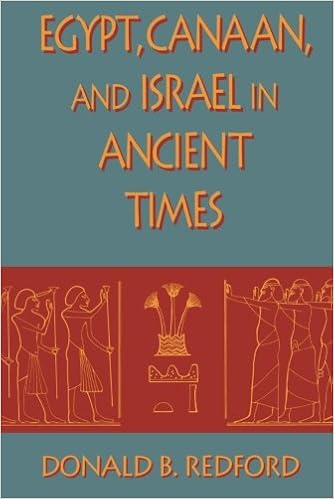
Naturally as an Egyptologist Redford relates the history of the Near East from the angle of Egyptian activity and thought, beginning from pre-dynastic times and following through to Assyrian empire, focusing mostly on Egyptian intercourse with Syria-Palestine, whether that be in the form of its control over its peoples, trade relations with them, or hostility towards them. (or in the case of the Hyskos, subordination) The origins of several Semitic groups, including the Israelite community, and those of different stock are explained, and there is a tangent of two chapters on the influence of Egypt on the Israelites in the political, ideological, cultic and literary spheres. All the events discussed acuminate with Nebuchadrezzar's destruction of Jerusalem, and an epilogue of two pages ends on a kind of cheesy note. But forgiving this, *Egypt, Canaan, and Israel in Ancient Times* is anything but a cheesy work. This is knitty-gritty historiography which far from 'attractively presents for the lay reader' anything. (see the review comment on the back cover by the *Journal of Palestinian Studies*) Nothing about Redford's book, excepting the pictures, maps, and tables perhaps, is 'lay'. That is, unless the laity in perspective are scholars who just aren't Egyptologists. Those unaccustomed to this kind of reading, with all its jargon and impressive eloquence, will find it overbearingly pedantic. Otherwise, you'll love it, as I did, and it will be easy enough to follow along. The footnotes are usually short and to the point, citing references with little or no comment, so no real worries about a choppy read, eyes moving constantly athwart between main text and footnote. (I hate that for myself) I would like to have seen provided a chronological chart for the periods discussed. I have other ready resources for this, but of course not everyone would. I wouldn't mind a bibliographical list either.
I only gripe with the fact that Redford gets a little caustic when he addresses biblical studies, and gives off the impression that all or most biblical scholars are 'apologists' for the historicity of the biblical tradition. This is misleading and in some cases I would say unfair. His passion for his own field erupts through the pages at this point, as is evident, e.g., from the first-person pronouns (268 & 421, when the norm of self-reference everywhere else is 'the present author') and remarks such as: 'At least we can thank such writers for providing us with comic relief.' [n.113, p.310] I don't think he should have crossed so antipathic to a field he's not an expert in...then he would not have made a mistake such as: 'The absence of the Exodus tradition from early Biblical material should also be noted.' [n.76, p.410]; but then not long later: 'Despite the lateness and unreliability of the story in Exodus, no one can deny that the tradition of Israel's coming out of Egypt was one of long standing. It is found in early poetry (e.g., Exod. 15) and is constantly alluded to by the prophets.' [412] My guess for such a contradiction is that he wrote the footnote some distance prior to discovering and writing the fact of the latter (despite their spatial closeness in the text) and never emended his error. However, on most counts I agree with the points he's making about biblical literature.
I'll be holding on to this one.
Fun Facts:
* There are multiple trivial flaws in this book of the humorous kind, like the sentence (64) ending with a comma ['...and perhaps disease, With all this...']; or the sentence (213) being interrupted by a period when it should have been a comma ['In fact, in the schematized scenes of tribute bringing. Syrian ornamental vases often stand symbolically...']; or the curious 'J. J. Rowley' for the proper 'H. H. Rowley'. (n.11, p.260)
* Redford states: 'The patient and observant reader will have noted that, up to this point in our study, no mention has been made of Israel' (257). This is false (172 & 237)
No comments:
Post a Comment